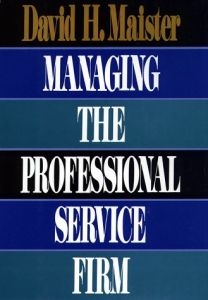Join getAbstract to access the summary!

Join getAbstract to access the summary!
David H. Maister
Managing the Professional Service Firm
Free Press, 1993
What's inside?
To make your professional service firm profitable, leverage senior and junior staff wisely, and put your clients first.
Recommendation
If you manage or work in a professional service firm, this book can put your operation into perspective by explaining what drives the firm’s profitability. Author David Maister uses his personal experiences to enliven some of the dryer parts of the text with a few case studies, first-hand observations and advice. He covers the whole range of essential practices encountered by any service firm, including governance, hiring, motivation, coaching, marketing and compensation. However, there is one important caveat: This classic book was first published in 1993, including the chapter on professional compensation, which particularly needs updating. Some chapters were published even earlier in various trade magazines and journals, some dating back to 1982. Is this information still fresh and accurate in today’s business environment? Even if the personnel advice is, the compensation counsel and pre-Internet marketing advice probably is not. With this caveat, getAbstract considers this foundational work important for anyone working in or with a professional service firm.
Summary
About the Author
David H. Maister, a former Harvard Business School professor, consults for professional service firms worldwide. He is also the co-author of The Trusted Adviser, Practice What You Preach and First Among Equals.





















Comment on this summary